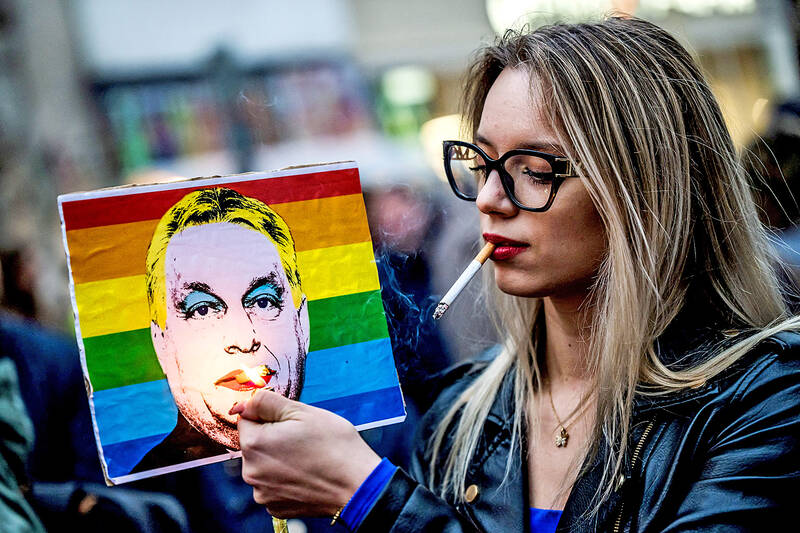A record number of people were expected to attend yesterday’s Pride march in Budapest, defying a ban that marks an unprecedented regression of LGBTQ rights in the EU.
Prime Minister Viktor Orban’s ruling coalition amended laws and the constitution earlier this year to prohibit the annual celebration, justifying his years-long clampdown on LGBTQ rights on “child protection” grounds.
While Orban has been emboldened by the anti-diversity offensive of US President Donald Trump, his own initiatives have drawn protests at home and condemnation from the EU and rights groups.

Photo: Reuters
Orban on Friday said that while police would not “break up” the 30th edition of the Pride march, those who took part should be aware of “legal consequences.”
Despite the risk of a fine, more than 35,000 people were expected to gather at 2pm near Budapest’s city hall, an hour before the march was to begin.
Ministers from several EU countries and dozens of European lawmakers are expected to attend in defiance of the ban, reminiscent of that in Moscow in 2006 and Istanbul in 2015.
“We are not just standing up for ourselves... If this law is not overturned, eastern Europe could face a wave of similar measures,” Pride organizer Viktoria Radvanyi said.
Earlier this week, European Commission President Ursula von der Leyen called on Hungarian authorities to reverse the ban.
Thirty-three countries have also spoken up in support of the march.
While parade organizers risk up to a year in prison, attendees can face fines up to 500 euros (US$585.95). The latest legal changes empower the authorities to use facial-recognition technology to identify those who take part. Freshly installed cameras have appeared on lamp posts along the planned route of the march.
However, opposition Budapest Mayor Gergely Karacsony has insisted that no attendee can face any reprisals as the march — co-organized by the city hall this time — is a municipal event and does not require police approval.
“The police have only one task tomorrow, and it is a serious one: to ensure the safety of Hungarian and European citizens attending the event,” Karacsony said during a briefing with visiting EU equalities commissioner Hadja Lahbib.
Far-right groups have announced multiple counterprotests along the planned route of the procession.
Hungarian Minister of Justice Bence Tuzson this week sent a letter to EU embassies cautioning diplomats and staff against participating, because of the police ban.
Several EU countries have informed their citizens of the potential of fines through travel advisories.
Since Orban’s return to power in 2010, the country of 9.6 million people has been steadily rolling back LGBTQ rights.
Legal changes have effectively barred same-sex couples from adopting children, prevented transgender people from changing their name or gender in official documents and a 2021 law forbade the “display and promotion” of homosexuality to those younger than 18.
In March, lawmakers passed a bill targeting the annual Pride march, amending the 2021 law to prohibit any gathering contravening its provisions. A month later, parliament also adopted a constitutional change to bolster the legal foundations for the ban.
“Orban is employing a tried-and-tested recipe ahead of next year’s election by generating a conflict,” political analyst Daniel Mikecz said, adding that Orban was “polarizing society.”

IDENTITY: A sex extortion scandal involving Thai monks has deeply shaken public trust in the clergy, with 11 monks implicated in financial misconduct Reverence for the saffron-robed Buddhist monkhood is deeply woven into Thai society, but a sex extortion scandal has besmirched the clergy and left the devout questioning their faith. Thai police this week arrested a woman accused of bedding at least 11 monks in breach of their vows of celibacy, before blackmailing them with thousands of secretly taken photos of their trysts. The monks are said to have paid nearly US$12 million, funneled out of their monasteries, funded by donations from laypeople hoping to increase their merit and prospects for reincarnation. The scandal provoked outrage over hypocrisy in the monkhood, concern that their status

The United States Federal Communications Commission said on Wednesday it plans to adopt rules to bar companies from connecting undersea submarine communication cables to the US that include Chinese technology or equipment. “We have seen submarine cable infrastructure threatened in recent years by foreign adversaries, like China,” FCC Chair Brendan Carr said in a statement. “We are therefore taking action here to guard our submarine cables against foreign adversary ownership, and access as well as cyber and physical threats.” The United States has for years expressed concerns about China’s role in handling network traffic and the potential for espionage. The U.S. has

A disillusioned Japanese electorate feeling the economic pinch goes to the polls today, as a right-wing party promoting a “Japanese first” agenda gains popularity, with fears over foreigners becoming a major election issue. Birthed on YouTube during the COVID-19 pandemic, spreading conspiracy theories about vaccinations and a cabal of global elites, the Sanseito Party has widened its appeal ahead of today’s upper house vote — railing against immigration and dragging rhetoric that was once confined to Japan’s political fringes into the mainstream. Polls show the party might only secure 10 to 15 of the 125 seats up for grabs, but it is

Trinidad and Tobago declared a new state of emergency on Friday after authorities accused a criminal network operating in prisons across the country of plotting to kill key government officials and attack public institutions. It is the second state of emergency to be declared in the twin-island republic in a matter of months. In December last year, authorities took similar action, citing concerns about gang violence. That state of emergency lasted until mid-April. Police said that smuggled cellphones enabled those involved in the plot to exchange encrypted messages. Months of intelligence gathering led investigators to believe the targets included senior police officers,